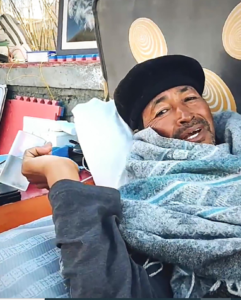Sonam Wangchuk’s:- Sonam Wangchuk, the prominent activist from Ladakh, has captured national attention with his recent fasting protest, urging Prime Minister Narendra Modi and Home Minister Amit Shah to prove themselves as statesmen. As he appeared frail on the 21st day of his fast, Wangchuk’s call for voter responsibility resonated deeply, emphasizing the importance of using the ballot power judiciously. This article delves into the significance of Wangchuk’s protest, his demands, and the broader implications for Indian democracy.  for more information click on this link
for more information click on this link
Sonam Wangchuk: A Champion for Change Sonam Wangchuk’s activism and advocacy for the Ladakhi people have earned him widespread admiration and respect. As the inspiration behind the character Phunsukh Wangdu in the Bollywood film “3 Idiots,” Wangchuk has used his platform to champion causes related to education, environmental conservation, and regional development. His decision to undertake a fasting protest reflects his unwavering commitment to seeking justice and accountability from the government.
The Fasting Protest Sonam Wangchuk’s: Demands and Expectations Wangchuk’s fasting protest, which entered its 21st day, has drawn attention to the pressing issues facing Ladakh and its people. His call for Prime Minister Modi and Home Minister Shah to prove themselves as statesmen underscores the need for decisive action and leadership on critical matters such as regional autonomy, environmental protection, and economic development. Wangchuk’s demands reflect the aspirations and concerns of the Ladakhi community, who seek meaningful engagement and representation from the central government.
Sonam Wangchuk’s Voter Responsibility and Democratic Engagement At the heart of Wangchuk’s message lies a plea for voter responsibility and conscientious democratic engagement. By urging voters to “use their ballot power very carefully,” he highlights the transformative potential of participatory democracy and the importance of holding elected representatives accountable. In an era marked by polarization and populism, Wangchuk’s call for informed and judicious voting resonates as a reminder of the fundamental principles of democratic governance. Regional Autonomy and Development The fasting protest led by Sonam Wangchuk underscores the complex socio-political dynamics of Ladakh and its quest for greater autonomy and development. As a region with unique cultural, geographical, and strategic significance, Ladakh’s aspirations for self-governance and sustainable growth must be addressed in a manner that respects its distinct identity and safeguards its interests. Wangchuk’s protest amplifies the voices of Ladakhi people, who seek meaningful representation and empowerment within the Indian state.
Implications for Government Sonam Wangchuk’s Response Wangchuk’s fasting protest poses a significant challenge to the government’s responsiveness and accountability. As his health deteriorates, the pressure on Prime Minister Modi and Home Minister Shah to address his concerns and engage in meaningful dialogue intensifies. The government’s response to Wangchuk’s demands will be closely scrutinized, not only by the Ladakhi community but also by civil society organizations, political observers, and the international community.
The Ladakh Conundrum Sonam Wangchuk’s:-
Conclusion and Reflection Sonam Wangchuk’s fasting protest serves as a poignant reminder of the power of peaceful dissent and the resilience of civil society in advocating for change. As he continues his fast, his message reverberates across India, inspiring reflection on the principles of democracy, citizenship, and governance. Whether his demands are met or not, Wangchuk’s courage and conviction leave an indelible mark on the collective conscience of the nation, challenging us to uphold the ideals of justice, equality, and democracy.





